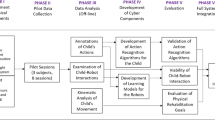Abstract
Motor experience plays a critical role in cognitive and social development. Developmental research has identified the major role of motor experience through manipulation and locomotion on the cognitive development of typically developing children. Children with physically disabilities cannot independently explore the environment and manipulate objects, and their motor impairments limit their opportunities for developing cognitive and social skills. Assistive technologies can provide the means for children with disabilities to independently interact with their physical and social environments. Assistive robots can provide children with disabilities with opportunities for object manipulation. This paper describes research using robots to understand and promote cognitive and social development of children with physical disabilities.
Access this chapter
Tax calculation will be finalised at checkout
Purchases are for personal use only
Preview
Unable to display preview. Download preview PDF.
Similar content being viewed by others
References
Butler, C.: Effects of powered mobility on self- initiated behaviours of very young children with locomotor disability. Dev. Med. Child. Neurol. 28, 325–332 (1986)
Piaget, J.: The Construction of Reality in the Child. Routledhe, Great Britain (1954)
Berthental, B., Campos, J., Kermoian, R.: An epigenetic perspective on the development of self- produced locomotion and its consequences. Curr. Dir. Psychol. Sci. 3, 140–145 (1994)
Jennings, K., MacTurk, R.: The motivational characteristics of infants and children physical and sensory impairments. In: MacTurk, R., Morgan, G. (eds.) Mastery Motivation: Origins, Conceptualization and Applications, pp. 201–220. Ablex Publishing Corporation, New Jersey (1995)
Poletz, L., Encarnação, P., Adams, K., Cook, A.M.: Robot skills and cognitive performance of preschool children. Technol. Disabil. 22(3), 117–126 (2010)
Judge, S., Floyd, K., Wood-Fields, C.: Creating a technology-rich learning environment for infants and toddlers with disabilities. Infant Young Child 23(2), 84–92 (2010)
Cook, A.M., Encarnação, P., Adams, K.: Robots: Assistive technologies for play, learning and cognitive development. Technol. Disabil. 22(3), 127–145 (2010)
Flanagan, J.R., Bowman, M.C., Johansson, R.S.: Control strategies in object manipulation tasks. Curr. Opin. Neurobiol. 16, 650–659 (2006)
McCarty, M.E., Clifton, R.K., Chollard, R.: The beginnings of tool use by infants and toddlers. Infancy 2(2), 233–256 (2001)
Rochat, P.: Object manipulation and exploration in 2- to 5- month old infants. Dev. Psychol. 25(6), 871–884 (1989)
Morabia, A.: A History of Epidemiologic Methods and Concepts. Birkhauser, Basel (2004)
Vygotsky, L.: The Collected Works of L.S. Vygotsky: The Fundamentals of Defectology, vol. 2. Kluwer Academic/Plenum Publishers, New York; Rieber, R., Carton, A. (eds.), Knox, J., Stevens, C. (trans.)
Vygotsky, L.: Mind in Society: The Development of Higher Psychological Processes. Harvard University Press, Cambridge (1978)
Shayer, M.: Not just Piaget; not just Vygotsky, and certainly not Vygotsky as alternative to Piaget. Learn. Instr. 13(5), 465–485 (2003)
Bundy, A.: Assessment of play and leisure: Delineation of the problem. Am. J. Occup. Ther. 47(3), 217–222 (1993)
Ferland, F.: The Ludic Model, 2nd edn. CAOT Publications ACE, Canada (2005); Scott, P. A. (trans.), Ottawa
Missiuna, C., Pollock, N.: Play deprivation in children with physical disabilities: The role of the occupational therapist in preventing secondary disability. Am. J. Occup. Ther. 45(10), 882–888 (1991)
Sutton-Smith, B.: The Ambiguity of Play. Harvard University Press, London (2001)
Reilly, M. (ed.): Play as Exploratory Learning: Studies of Curiosity Behavior. Sage, Beverly Hills (1974)
Besio, S.: Analysis of Critical Factors Involved in Using Interactive Robots for Education and Therapy of Children with Disabilities. UNI Service, Trento (2008)
Blanche, E.I.: Play in children with cerebral palsy: doing with-not doing to. In: Parham, L., Fazio, L. (eds.) Play in Occupational Therapy for Children, pp. 375–393. Mosby Elsevier, St. Louis (2008)
Rosen, L., Arva, J., Furumasu, J., Harris, M., Lange, M., McCarthy, E., et al.: RESNA position on the application of power wheelchairs for pediatric users. Assist. Technol. 21, 218–226 (2009)
Cook, A.M., Liu, K., Hoseit, P.: Robotic arm used by very young motorically disabled children. Assist. Technol. 2, 51–57 (1990)
Cook, A.M., Polgar, J.M.: Cook and Hussey’s Assistive Technologies: Principles and Practice, 3rd edn. Elsevier Inc., Philadelphia (2008)
McCormack, T., Hoerl, C., Butterfill, S.: Tool Use and Causal Cognition. Oxford University Press (2011)
Keen, R.: The development of problem solving in young children: A critical cognitive skill. Annu. Rev. Psychol. 62, 1–21 (2011)
Cook, A.M., Adams, K., Encarnação, P., Alvarez, L.: The role of assisted manipulation in cognitive development. Dev. Neurorehab. 15(2), 136–148 (2012)
Cook, A.M., Howery, K., Gu, J., Meng, M.: Robot enhanced interaction and learning for children with profound physical disabilities. Technol. Disabil. 13(1), 1–8 (2000)
Author information
Authors and Affiliations
Corresponding author
Editor information
Editors and Affiliations
Rights and permissions
Copyright information
© 2013 Springer-Verlag Berlin Heidelberg
About this paper
Cite this paper
Alvarez, L., Rios, A.M., Adams, K., Encarnação, P., Cook, A.M. (2013). From Infancy to Early Childhood: The Role of Augmentative Manipulation Robotic Tools in Cognitive and Social Development for Children with Motor Disabilities. In: Pons, J., Torricelli, D., Pajaro, M. (eds) Converging Clinical and Engineering Research on Neurorehabilitation. Biosystems & Biorobotics, vol 1. Springer, Berlin, Heidelberg. https://doi.org/10.1007/978-3-642-34546-3_147
Download citation
DOI: https://doi.org/10.1007/978-3-642-34546-3_147
Publisher Name: Springer, Berlin, Heidelberg
Print ISBN: 978-3-642-34545-6
Online ISBN: 978-3-642-34546-3
eBook Packages: EngineeringEngineering (R0)




